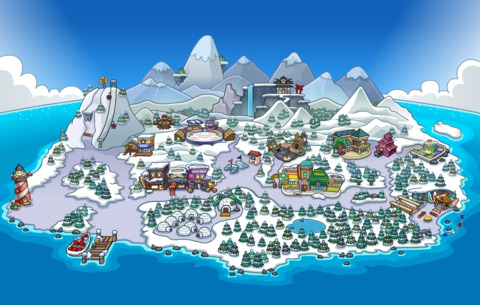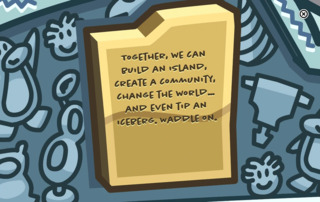Overview
Originally launched on October 24, 2005 by Disney Canada (then New Horizon Interactive), Club Penguin was a popular virtual world browser game aimed at kids and teens. The game featured a chat system, customizable penguin characters, virtual pets, several minigames, as well as quests, often connected to the series' standalone entries. The game also featured a premium subscription system, allowing monthly subscribers access to a wider array of clothing items, puffles, and igloo customization options.
In 2013, a mobile app for the game was introduced, beginning with iPad before expanding to iPhone and Android in 2014.
On January 30, 2017, it was announced that services for Club Penguin were to be discontinued in anticipation of Adobe Flash's end of life, as well as to shift players towards Club Penguin Island. Following an in-game party event beginning the day after the announcement, Club Penguin was officially taken offline in March of the same year.
In February 2017, fans of Club Penguin launched Club Penguin Rewritten, an attempted resurrection using files from the original game. The most popular fan-revival of Club Penguin, Rewritten garnered roughly 10 million users, eventually leading the project's team to add new, original content, and in-game advertising. On April 13, 2022, Rewritten was taken offline in response to a copyright infringement claim by Disney.
Locations
Club Penguin Island
 Club Penguin Island as it appeared in 2015
Club Penguin Island as it appeared in 2015The first location added to Club Penguin, Club Penguin Island is the largest location in the game, and the starting point for all new players. The island resembles a typical city, featuring a number of businesses, including a night club, arcade, dojo, pet shop, pizza parlor, and mall, alongside additional locations such as a beach, a gold mine, a school, and a lighthouse.
Due to its size, a large number of Club Penguin's minigames are located throughout Club Penguin Island, as well as being where most of the game's clothing and furniture items could be purchased.
During the game's life, Club Penguin Island was temporarily redesigned a number of times to fit the theming of various parties, special events, and crossovers. This included simple aesthetic redesigns such as the "prehistoric" redesigns, which featured stone architecture and increased foliage, and "future" redesigns featuring alien plants and buildings, alongside robots and floating satellites. The island was redesigned thrice for promotional crossovers, twice for superhero-themed Marvel crossovers, and once for a 2014 crossover with Star Wars Rebels.
The Iceberg
A relatively small location near Club Penguin Island, the iceberg acted primarily as a social space, as well as the entry point for a few mini-games related to the game's Elite Penguin Force quest line. Despite its unassuming appearance, the iceberg became one of Club Penguin's most recognizable locations due to a prominent rumor that the iceberg could be tipped over. Various theories existed as to how this would occur, from enough penguins standing on the iceberg at once, to enough penguins using the game's jackhammer emote on a specific spot of the iceberg.
 The iceberg plaque added in 2017
The iceberg plaque added in 2017 Despite these rumors, no way to tip the iceberg existed in the game's code until January 31, 2017. After January 31, the iceberg could be tipped if enough penguins wore blue cosmetic items and a hard hat, and danced anywhere on the iceberg. Once tipped, the iceberg would flip over, revealing a dance floor, a free hard hat item, and a plaque commemorating Club Penguin's history and community, as well as the iceberg rumor.
The Migrator
Typically found docked on the beach of Club Penguin Island, the Migrator was a pirate ship offering a variety of pirate-themed items. As part of a 2012 quest, the Migrator could also travel to certain other islands, including a prehistoric island and a pirate-themed trading outpost.
PSA/EPF Headquarters
Introduced in 2005, the Penguin Secret Agency (PSA) was a spy organization located underneath Club Penguin Island. The organization's headquarters acted as the focal point for PSA missions, quests and minigames which could be undertaken by players whose accounts were at least a month old. The organization's quests primarily focused around Herbert P. Bear, a newly introduced polar bear character who posed a constant threat to Club Penguin Island.
 The EPF control room
The EPF control roomIn 2010, the original PSA headquarters was destroyed by Herbert as part of the ongoing quest line. PSA HQ was replaced by the Elite Penguin Force (EPF), a replacement for the PSA first introduced in the standalone title Club Penguin: Elite Penguin Force. Playing Elite Penguin Force was required in order for players to access the new EPF facility in Club Penguin, unless they had previously passed the PSA initiation test.
The EPF's introduction brought with it additional quests, tying directly into a new standalone title. The EPF headquarters also offered access to most PSA missions, alongside new minigames.
Special Events
A number of in-game parties were hosted throughout Club Penguin's thirteen-year run, typically for holidays and crossover events. The majority of these events involved redesigned versions of existing areas from Club Penguin Island, although many featured additional areas only accessible during their respective parties.
Various buildings, including a haunted mansion, a bakery, and a store selling cardboard boxes, were party exclusive. As well, locations from other properties (such as the Death Star) were typically exclusive to the crossover event which introduced them. Events tied to the PSA/EPF quest lines also introduced a number of event-restricted locations.
Minigames
Scattered throughout the world of Club Penguin, minigames offer players the ability to earn coins to spend on clothing, furniture, and various other in-game items. Coins offered by a given minigame are typically based on a player's performance, with more coins being paid the further a player makes it or the higher their final score.
Some, but not all, of the minigames available in Club Penguin are as follows:
- Astro Barrier: A target-shooting arcade game.
- Bean Counters / Jellybean Counters: A minigame in which players catch sacks of coffee beans or jellybeans tossed from a van, attempting to stack them without catching an anvil, fish, or flower pot instead.
- Cart Surfer: A game in which players ride a mine cart down a tunnel, attempting to perform tricks without wiping out.
- Dance Contest: A rhythm game comparable to the Dance Dance Revolution series of games.
- Find Four
- Jet Pack Adventure: A minigame requiring players to maneuver around obstacles and projectiles while collecting enough jet pack fuel to stay afloat.
- Mancala
- Pizzatron 3000 / Candytron 3000: Players are presented with a series of increasingly difficult pizza (or dessert pizza) orders, the game ending after 40 orders or five incorrectly made orders.
- Sled Racing: A competitive downhill race for up to four penguins, involving snow-ramps, ice patches, and obstacles.
- Thin Ice: A nineteen-level puzzle game featuring a puffle which melts ice as it moves.
Card-Jitsu
Introduced in 2008 alongside a real-life trading card game, Card-Jitsu was a card-based minigame playable via the dojo. The game revolved around elemental guessing comparable to rock paper scissors, albeit with the inclusion of "power cards". Players would select a card from their deck, differentiated by color, number, and element. Once both players had selected a card, the two selected cards would be compared. Fire would beat snow cards, which in turn would beat water cards, which would beat fire cards. Power cards still came with elements, numbers, and colors, although would feature additional effects such as swapping card values, changing elements, or restricting the play of a given element.
In the case both players selected the same element, the winner was determined through number value. The winning card would be placed in the playing penguin's set, with a player winning upon having one of each element, each of a different color, or three cards of an element, each of a different color. When a player had played enough matches, they would earn certain colors of ninja belt, with a final ninja mask awarded for defeating Sensei in a game of Card-Jitsu.
Puffles
 A standard blue puffle
A standard blue puffleAdded to Club Penguin shortly after the game's launch, puffles are virtual pets adoptable for 400 coins (initially 800.) They come in a variety of colors and types, including special rainbow, gold, alien, and dinosaur variants, among many, many others. Once a player had adopted one or more puffles, they could select a puffle as their primary puffle, at which point it would follow them around throughout the game world.
Each standard puffle could be fed, played with, rested, and dressed, influencing their stats or appearance. As a puffle's stats improved, they would occasionally dig up items from the environment.
Other Media
Due to Club Penguin's popularity, a number of other media was created around the property.
Beyond the game's attempted reboot, Club Penguin Island, the Club Penguin series received three additional standalone games: Elite Penguin Force, Elite Penguin Force: Herbert's Revenge, and Game Day. All three titles featured interactivity with Club Penguin, offering in-game items for redeeming codes from each game. As well, both Elite Penguin Force titles allowed players to earn coins in-game which would then be transferred to their Club Penguin account.
A number of animations themed around the game were also created, including eleven shorts posted to the official Club Penguin Youtube account prior to its deletion on December 20, 2018. Three 22-minute stop motion specials were also created for the series, aired via Disney Channel and the official Club Penguin blog.
Log in to comment